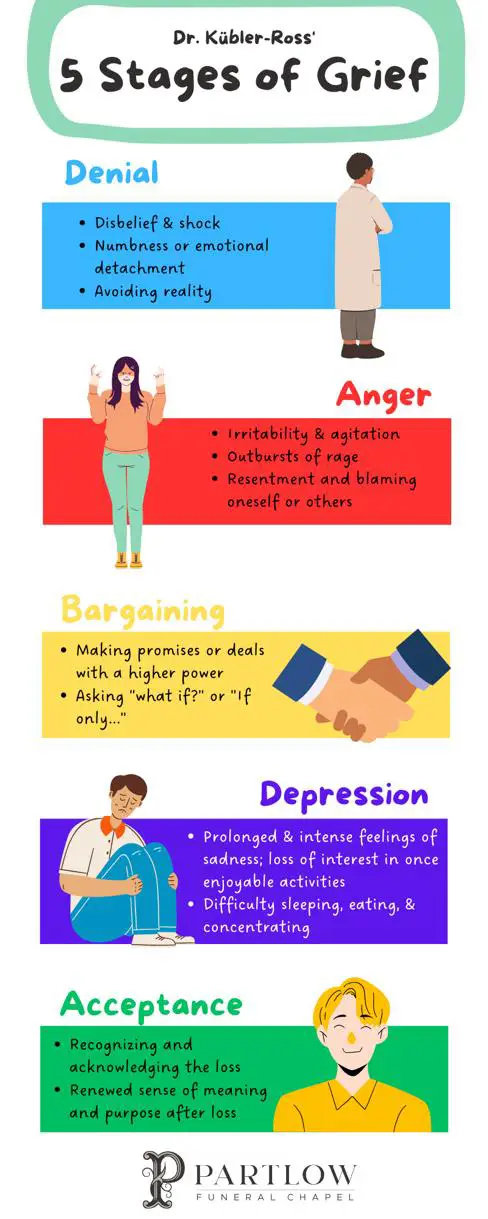Supporting Grieving Friends and Family
How to Offer Comfort and Understanding During a Difficult Time
Experiencing the loss of a loved one is one of the most difficult challenges life can throw at us. The emotions that accompany grief can be complex and, at times, overwhelming. When someone we know and love is faced with such a loss, our hearts ache to provide the same comfort and support we would have wanted during our own times of grief. Even though we want to be there for that person, it can be difficult to know how best to do so.

We understand, which is why in this article we’ll offer practical guidance and advice for those who want to support their loved one during their grieving journey. By exploring the grieving process, effective communication strategies, and various methods of offering support, this resource will help you navigate this delicate and difficult journey with compassion, allowing you to be there for your grieving friend or family member when they need you the most.
The Grieving Process: What to Expect
Grieving is a natural response to losing someone we love and cherish. While everyone's grief journey is unique, there are some common emotions and reactions that many people experience. These can include feelings of shock, disbelief, sadness, anger, guilt, and even relief. It's important to remember that there is no right or wrong way to grieve, and each person's experience will be influenced by factors such as their relationship with the deceased, their cultural background, and their coping mechanisms.
Grieving is a unique and individual experience, with varying timelines
While there are some general stages of grief that many people experience, such as denial, anger, bargaining, depression, and acceptance, it's crucial to understand that the grieving process is not linear. Some individuals may experience these stages in a different order or even revisit certain stages multiple times. The timeline for grieving is also highly individual, with some people finding a sense of closure relatively quickly, while others may take months or even years to come to terms with their loss. Recognizing that grieving is an individual and unique experience can help in approaching your friend or loved one with openness and understanding, rather than imposing expectations or timelines on their healing process.

Effective Communication with Grieving Individuals
One of the most important things you can do for someone who is grieving is to simply be there for them. Offering a listening ear, a shoulder to cry on, or a comforting presence can go a long way in providing support. Active listening, which involves giving your full attention to the person speaking, can help validate their feelings and make them feel heard and understood. It's important to be patient, as your loved one may need time to find the right words or may express themselves through tears or silence.
What to say (and what not to say) to someone who is grieving
Knowing what to say to someone who is grieving can be tough, as we often worry about saying the wrong thing or unintentionally causing more pain. In general, it's helpful to offer genuine expressions of sympathy and empathy, such as "I'm so sorry for your loss" or "I can't imagine what you're going through, but I'm here for you." Avoid cliches like "They're in a better place" or "At least they lived a long life," as these can minimize the person's pain and make them feel misunderstood.
It's also important to remember that sometimes, silence can be more comforting than words. Simply being there, holding their hand, or offering a hug can provide more solace than any words could.

Tips for effective communication
- Validate their feelings: Acknowledge their emotions and let them know that it's okay to feel the way they do.
- Avoid offering unsolicited advice: Grieving individuals may not be ready for advice or solutions. Focus on listening and offering comfort instead.
- Be sensitive to their needs: Pay attention to their body language and cues to determine when they need space or when they want to talk.
- Share memories: Sharing stories about the deceased can help honor their memory and provide comfort to the grieving person.
- Offer open-ended questions: Instead of asking yes or no questions, try asking open-ended questions that encourage them to share their thoughts and feelings, such as "How are you feeling today?" or "What can I do to help you right now?"
Practical Ways to Offer Support
During times of grief, it can be difficult for individuals to manage everyday tasks and responsibilities. Offering practical support, such as cooking a meal, cleaning their home, or running errands, can help alleviate some of the stress they may be experiencing. These gestures show that you care and can make a significant difference in their day-to-day life.
Specific rather than generic offers of help
While it's important to let your grieving loved one know that you're there to help, offering specific assistance can be more beneficial than making general offers. For example, instead of saying "Let me know if you need anything," try offering concrete suggestions, such as "I can pick up groceries for you on Wednesday" or "I'm available to watch the kids on Saturday if you need some time to yourself." This makes it easier for the grieving person to accept help, as they don't have to think of a task for you or feel like they're imposing.

Respecting boundaries and preferences
As you offer support, it's crucial to respect your loved one's boundaries and preferences. Some people may appreciate frequent check-ins, while others may prefer more space and solitude during their grieving process. Be sure to ask about their preferences and follow their lead. Additionally, if they decline your offer of help or request some alone time, try not to take it personally. Remember that everyone grieves differently, and your loved one may need to find their own way to cope with their loss. By respecting their boundaries, you're showing that you care and are there for them when they're ready to accept your support.
Emotional Support: Validating and Acknowledging Grief
One of the most essential aspects of emotional support is validating and acknowledging your loved one's feelings. Grieving individuals often experience a wide range of emotions, and it's important to let them know that their feelings are natural and valid. By doing so, you create an environment where they feel safe and comfortable expressing themselves, which can be crucial to their healing process.
Being a comforting presence
Being a comforting presence for your grieving friend or family member involves more than just offering a shoulder to cry on. Here are some tips to help you be a supportive companion during their grief journey:
1. Practice active listening: Give your full attention when they speak and avoid interrupting or offering unsolicited advice.
2. Be patient: Understand that healing takes time, and your loved one may need to express their emotions repeatedly.
3. Validate their emotions: Let them know that their feelings are natural and that it's okay to experience a wide range of emotions.
4. Offer reassurance: Remind them that they are not alone and that you are there to support them through this challenging time.
5. Avoid comparisons: Refrain from comparing their grief to your own or someone else's, as this can minimize their feelings and make them feel misunderstood.
Role of shared memories and stories
Sharing memories and stories about the deceased can be a powerful way to support a grieving individual. These shared experiences can help keep the memory of their loved one alive and provide a sense of connection and comfort. Encourage your loved one to share their favorite memories, and don't hesitate to share your own stories as well. By doing so, you can create a space where the grieving person feels understood and supported, fostering an environment that promotes healing and growth.
Supporting on Special Occasions

Special occasions such as holidays, birthdays, and anniversaries can be particularly difficult for those in grief. This can especially be true on the first occasions of these moments without their lost loved one. These days often serve as poignant reminders of the loss, triggering intense emotions. Offering your support during these times can mean a lot to your loved one. Here are some ways you can provide support:
1. Reach Out: Sending a message or making a call to let them know you're thinking of them can mean a lot. This simple act of kindness can provide comfort and a sense of connection.
2. Be There: If possible, spend time with your loved one on these special occasions. Your presence can help them navigate the emotional waves that these dates often bring.
3. Share Memories: If it feels appropriate, share fond memories of the deceased. These shared recollections can offer solace and a sense of closeness to the person they lost.
4. Respect Their Wishes: They may wish to spend the day alone, or they may want to honor the memory of their loved one in a specific way. Always respect their wishes and offer your support in a manner that aligns with their needs.
Encouraging Self-Care and Professional Help
Encouraging self care
Grief can be all-consuming, often leading those grieving to neglect their own physical, emotional, and mental health. However, self-care plays a crucial role in the healing process. It's not about moving on or forgetting about the loss, but about nurturing oneself amidst the pain. Simple acts such as maintaining a balanced diet, getting regular exercise, and ensuring adequate sleep can help strengthen one's resilience and coping ability during this difficult time. Although we know this is true, encouraging someone grieving to take care of themselves can be a difficult and sensitive task. Here are some suggestions that may help in bringing this subject to light:
1. Lead by example: Show them how you take care of your own mental and physical health. This can give confidence to the person grieving that this lifestyle is possible moving forward.
2. Offer to participate with them: Whether it's going for a walk, cooking a nutritious meal, or attending a yoga class together, your participation can provide motivation.
3. Remind them gently: Regularly reinforce the importance of self-care and its impact on their overall well-being. This doesn’t have to come in the form of direction, ask them to take part in the activities mentioned above.
4. Give them space: Allow them to decide what self-care looks like for them. It could be as simple as reading a book, taking a bath, or spending time in nature.
Suggesting professional help

While friends and family can provide significant support, there are times when professional help may be necessary. This could be the case if your loved one is experiencing intense feelings of guilt or worthlessness, having difficulty carrying out daily activities, or expressing thoughts of death or suicide. If this is the case, suggest they consider seeking professional help, such as a grief counselor or therapist.
Gently bring up the topic by expressing your concern and emphasizing that it's okay to seek help. You might say, "I've noticed that you've been really struggling lately, and I wonder if talking to a professional could provide some additional support."
With technology today, gaining access to a professional counselor is much simpler than in the past. Websites such as www.betterhelp.com offer a variety of therapy options that are available remotely via live chat, phone, or video.
Remember, though, it's ultimately their decision whether to seek out professional help, and it's important to respect your loved one’s choices.
Being Patient and Understanding
Patience and understanding are two of the most important virtues you can offer someone who is grieving. Grief doesn't follow a set schedule; it's a process that unfolds differently for everyone. Your loved one may have good days where they seem to be coping well, and other days where the weight of their loss feels unbearable.
It's essential to understand that grief often involves taking two steps forward and one step back. There may be setbacks along the way, and that's okay. It's a normal part of the grieving process. Try to resist the urge to rush them through their grief or expect them to "move on" after a certain period of time.
Support after the initial stages of grief

The initial period following a loss is often filled with a flurry of support from friends and family. However, as time goes on, that support may dwindle, leaving the grieving individual feeling alone in their sorrow. It's important to continue your support long after the initial stages of grief have passed. Here are some suggestions on how to do this:
1. Regular Check-Ins: Continue to check in with them regularly. Let them know that you're still there for them, even if it's been months or even years since their loss.
2. Remember Important Dates: Acknowledge anniversaries, birthdays, or other significant dates. This shows your loved one that you remember their loss and are there to support them during these potentially difficult times.
3. Keep Inviting Them Out: Continue to include them in social events or casual outings. They may not always feel up to it, and that's okay. The important thing is that they know they are still included in your life.
4. Listen: Continue to be a good listener. Let them talk about their loved one and their feelings as much as they need to.
Taking Care of Yourself
While it's crucial to provide support to a grieving loved one, it's equally important to take care of yourself. Grief can be emotionally draining not just for those directly affected but also for those around them. Neglecting your own needs and emotions can lead to burnout and may affect your ability to provide effective support.
Setting boundaries can be a vital aspect of self-care during this time. While you want to be there for your loved one, it's okay to take time for yourself and attend to your own emotional health. Take some of the same advice mentioned beforehand and apply it to yourself:
1. Practice Self-Care: Engage in activities that you enjoy and that help you relax. This could include reading, exercising, or spending time in nature.
2. Seek Support: Just as your loved one needs support, so do you. Reach out to friends, family, or a mental health professional to talk about your feelings and experiences.
3. Take Breaks: Allow yourself to take breaks from the caregiving role when needed. It's okay to take a step back and recharge.
4. Stay Healthy: Make sure to eat a balanced diet, get regular exercise, and ensure you're getting enough sleep. Physical health has a direct impact on your emotional well-being.
By prioritizing your own well-being, you'll be in a better position to provide ongoing support to your loved one. Remember, it's not selfish to take care of yourself. In fact, it's necessary for both you and the person you're supporting.
Conclusion
Navigating grief can be a tumultuous journey, both for those who are grieving and for the loved ones supporting them. Your efforts to offer comfort and understanding are invaluable, serving as a warm reminder that they are not alone in their sorrow. Remember, your role isn't about fixing, but about providing a steady presence amidst the storm of their grief.
In the end, it's the simple acts of kindness and empathy, the patient listening, and the shared memories that often make the most significant impact. Supporting someone through grief isn't easy, but it's a journey of profound love and connection that affirms our shared human experience. We hope this guide serves as a helpful resource in your journey of offering support.
To continue the journey of supporting a grieving friend or family member, we encourage you to explore the additional resources available on our website. We have a wealth of information on grief, loss, and healing that can provide further guidance and support. If you or your loved one need direct assistance, please don't hesitate to reach out to our family here at Partlow Funeral Chapel. Remember, you are not alone in this journey, and we're here to help. You can find our phone number, address, and email on our “Contact Us” page.
